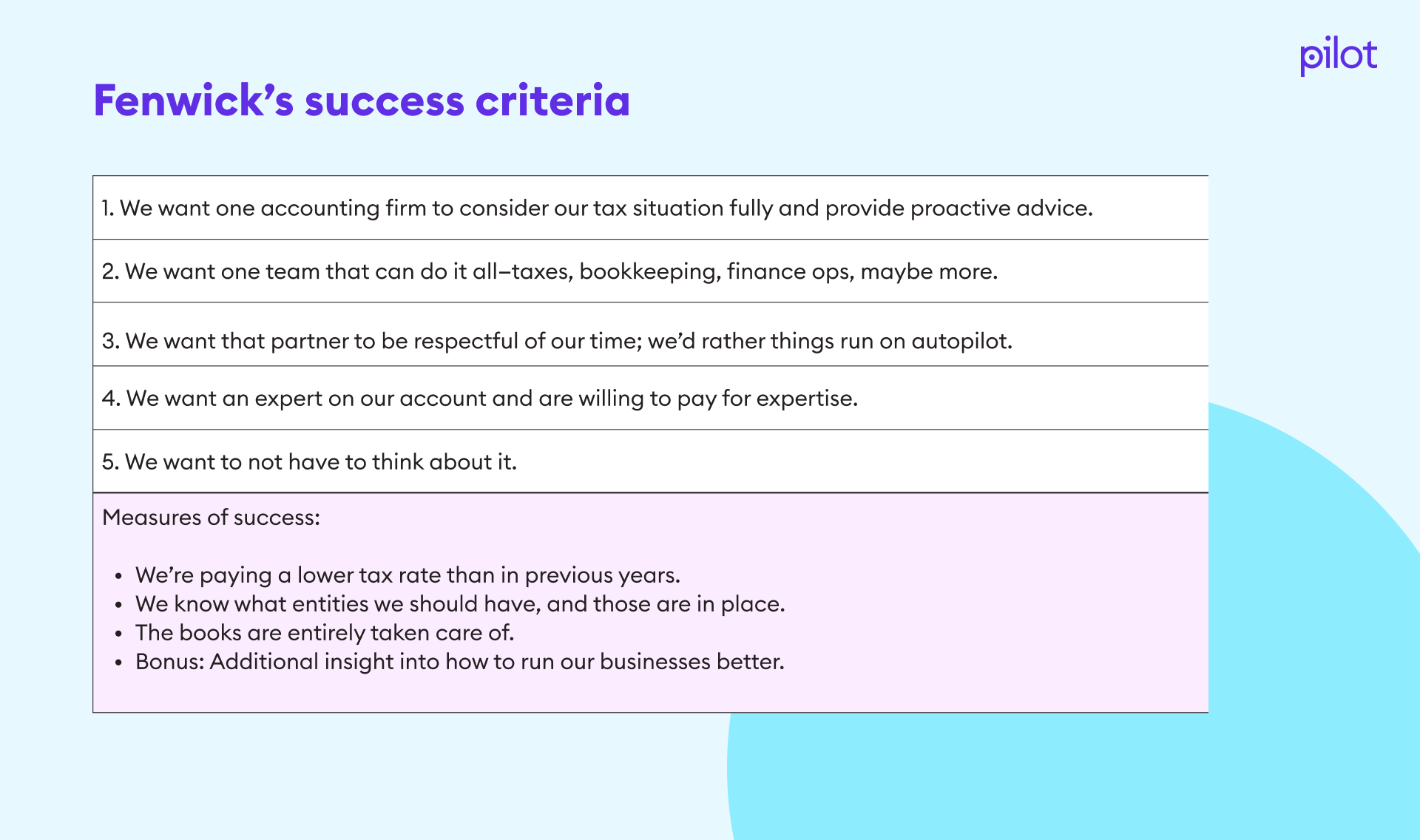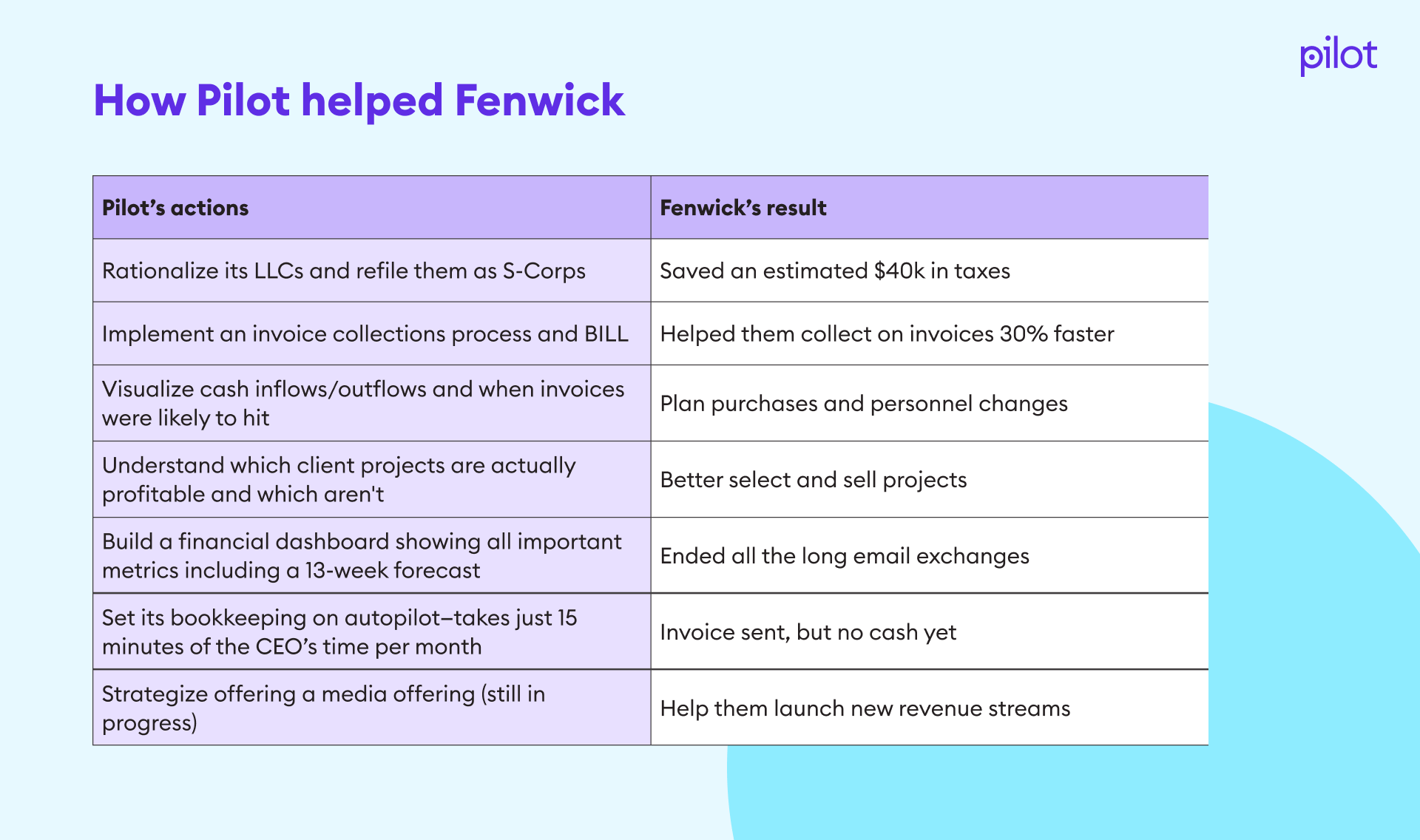Delaware Franchise Tax is due March 1. We'll prepare yours for free.
START NOW

Saved an estimated $40k in taxes—By rationalizing the LLCs and refiling them as S-Corps.

Helped them collect on invoices 30% faster—With a new invoicing procedure and the software BILL.

Helped to plan purchases and personnel changes—By visualizing cash inflows and outflows, including a tracker to show when invoices would hit.

Better project scoping and pricing—By understanding which clients were profitable and which weren't.

“It’s the stability and mundanity I always craved.”

Fenwick is a creative studio of uncommonly clear writers and designers with little finance acumen. They hired their first fractional bookkeeper and invested in her “quasi-dictatorial powers”—she did everything from contracts to reconciliations. But when she retired, no one could replace her. Things began to fall apart.
Fenwick’s client list was growing rapidly, but invoices were getting lost. Fenwick’s tax accountant had okayed a complex multi-LLC structure, but the IRS was now sending warning letters. Then Fenwick got hit with a catastrophic tax bill.
“Fenwick has never had trouble with demand or with delivering on our work. But with operational things, we were always looking around asking, ‘Who has the answer? Surely someone else has done this before?’” says Chris Gillespie, Co-Founder and CEO. “But none of us had an agency background so we just kept reinventing things. We didn’t have financial connections to ask.”
The recurring cash crunches threw them over the edge—they’d have piles of past-due invoices and plenty of money in theory, but never enough in the bank. Fenwick churned through three accountants and several bookkeepers in six years. “By the end, we were desperate for one expert who’d clean it all up,” says Chris. Pilot finally did.
Fenwick is a professional services business that creates marketing strategies, articles, and assets for tech companies—not a complicated business model. Just services for hire. But the tangle of outside accountants, bookkeepers, and finance admins had caused Chris and team to build equally tangled systems to cope. Chris built and maintained his own spreadsheet with columns for months and rows for every single invoice.
“This gave us what I now recognize to be a totally illusory sense of control,” says Chris. “With our old spreadsheet, it always looks like you’re just about to have a windfall. But I wasn’t updating the expenses properly.” Further, Fenwick was doing its bookkeeping on a cash basis which meant they only counted income as it hit their bank. Income whipsawed every month and there was no real way to forecast or plan.
Meanwhile, they’d charged forward with their dual LLC scheme to give employees profit share. Each LLC owned a stake in the other, and it was overly complicated for what they wanted to achieve. In 2023, filing as two pass-through LLCs caused them to pay a lot in taxes.
“I was in a moment of overwhelm, and I blindly signed our accountant’s tax forms thinking, ‘We can always refile later,’” says Chris. “Which is true. But you can’t retroactively change your entity type. So we were locked into a bad decision. We had another accountant run the numbers, and it was grim—if we’d have been an S-corp, we’d have saved $40k.”
We had another accountant run the numbers, and it was grim—if we’d have been an S-corp, we’d have saved $40k.”
When Chris confronted their accounting firm about this, the firm did not take responsibility. “They basically said, ‘You should have known to pay us even more to run a study about changing your entity type,’’’ says Chris, “and I almost lost it. Nobody was actually helping. Nobody cared about the whole Fenwick view.”
This is why Pilot’s message resonated with such clarity: 50% software, 50% people—dashboards when you need answers, experts to talk to when you have questions. One financial team, all the services, from bookkeeping to financial modeling.
Chris had heard similar promises before, so to cover his bases, he still evaluated three other accounting firms. His criteria were:

Pilot was the one team that gave Chris enough confidence. The other traditional accounting firms all had limitations—some did bookkeeping, but not reconciliations. Some offered “advisory” but couldn’t explain what it included. Most asked Chris what he wanted them to do—but Chris didn’t want to do any explaining. He wanted the opposite.
“What I wanted above all else is someone who knew how an agency should be set up and to tell me how to do it,” says Chris. “How would I know a good reconciliation process? Or whether we should be accrual? It was just frustrating.”
What I wanted above all else is someone who knew how an agency should be set up and to tell me how to do it.”
In the sales calls with Pilot, Chris got to talk to a Pilot CFO accustomed to helping creative agencies, and those conversations won him over. “Pilot’s questions were of a different order entirely—they were asking for background details so they could tell me what to do. I trusted they had a plan,” says Chris.
It also mattered that Pilot is a tech startup—just like the companies Fenwick serves. Chris loves precision and economizing time, and whereas past bookkeepers wanted to meet weekly and ran up sprawling email threads of 100+ responses, Pilot offers a software platform where he can message his bookkeeper and leave comments.
Fenwick’s Pilot bookkeeper and controller kicked off the engagement by reviewing Chris’ extensive documentation and Loom videos. They set Fenwick up on accrual-based books and retroactively re-filed the prior quarter of expenses to get the general ledger set up right.
On the strategic side, Fenwick’s Pilot CFO Alicia, created a professional services model for Fenwick, and they met every two weeks, reviewing the numbers and refining. “Once I realized what having a CFO actually meant, it was a revelation,” says Chris. Alicia took Fenwick’s project management data from Notion, where the Fenwick team manages client projects, and cross-referenced the number of projects Fenwick was delivering to each client each month with how much those clients were paying, to produce a metric—cost per work delivered. For the first time, Fenwick had a total view of how they make money and deliver projects.
“That model is revolutionary,” says Chris. “And there were so many little things she did in that spreadsheet that make it an actual view of the business: She has a timeline that shows me when invoices are likely to hit based on how delayed clients have been in the past. I can see my cash balance 13 weeks out, a stacked bar chart for what we paid each contractor over the last 12 months, and what invoices are past due.”
In total, Pilot helped Fenwick:

The result is that Chris is clear on Fenwick’s first quarter after working with Pilot, margins had turned positive. Chris now understands which client projects are profitable, and has put an end to the studio’s cash-crunch saga.
“It’s the stability and mundanity I always craved,” says Chris, “And that’s largely because our CFO Alicia, does not let me forget things. She tells me what to do. Sometimes she doesn’t let things go, and I relent, and it ends up being the right choice. Pilot is the all-in-one provider we were looking for—plus the CFO-level guidance we didn’t know we needed.”
Watch Chris explain how they calculate their profit.
.svg)
Fenwick is a studio for uncommonly clear strategy, writing, and design focused primarily on B2B tech companies, VC firms, and consultancies. Basically any business that needs a sharp wit.
Fenwick is a creative studio of uncommonly clear writers and designers with little finance acumen. They hired their first fractional bookkeeper and invested in her “quasi-dictatorial powers”—she did everything from contracts to reconciliations. But when she retired, no one could replace her. Things began to fall apart.
Fenwick’s client list was growing rapidly, but invoices were getting lost. Fenwick’s tax accountant had okayed a complex multi-LLC structure, but the IRS was now sending warning letters. Then Fenwick got hit with a catastrophic tax bill.
“Fenwick has never had trouble with demand or with delivering on our work. But with operational things, we were always looking around asking, ‘Who has the answer? Surely someone else has done this before?’” says Chris Gillespie, Co-Founder and CEO. “But none of us had an agency background so we just kept reinventing things. We didn’t have financial connections to ask.”
The recurring cash crunches threw them over the edge—they’d have piles of past-due invoices and plenty of money in theory, but never enough in the bank. Fenwick churned through three accountants and several bookkeepers in six years. “By the end, we were desperate for one expert who’d clean it all up,” says Chris. Pilot finally did.
Fenwick is a professional services business that creates marketing strategies, articles, and assets for tech companies—not a complicated business model. Just services for hire. But the tangle of outside accountants, bookkeepers, and finance admins had caused Chris and team to build equally tangled systems to cope. Chris built and maintained his own spreadsheet with columns for months and rows for every single invoice.
“This gave us what I now recognize to be a totally illusory sense of control,” says Chris. “With our old spreadsheet, it always looks like you’re just about to have a windfall. But I wasn’t updating the expenses properly.” Further, Fenwick was doing its bookkeeping on a cash basis which meant they only counted income as it hit their bank. Income whipsawed every month and there was no real way to forecast or plan.
Meanwhile, they’d charged forward with their dual LLC scheme to give employees profit share. Each LLC owned a stake in the other, and it was overly complicated for what they wanted to achieve. In 2023, filing as two pass-through LLCs caused them to pay a lot in taxes.
“I was in a moment of overwhelm, and I blindly signed our accountant’s tax forms thinking, ‘We can always refile later,’” says Chris. “Which is true. But you can’t retroactively change your entity type. So we were locked into a bad decision. We had another accountant run the numbers, and it was grim—if we’d have been an S-corp, we’d have saved $40k.”
We had another accountant run the numbers, and it was grim—if we’d have been an S-corp, we’d have saved $40k.”
When Chris confronted their accounting firm about this, the firm did not take responsibility. “They basically said, ‘You should have known to pay us even more to run a study about changing your entity type,’’’ says Chris, “and I almost lost it. Nobody was actually helping. Nobody cared about the whole Fenwick view.”
This is why Pilot’s message resonated with such clarity: 50% software, 50% people—dashboards when you need answers, experts to talk to when you have questions. One financial team, all the services, from bookkeeping to financial modeling.
Chris had heard similar promises before, so to cover his bases, he still evaluated three other accounting firms. His criteria were:

Pilot was the one team that gave Chris enough confidence. The other traditional accounting firms all had limitations—some did bookkeeping, but not reconciliations. Some offered “advisory” but couldn’t explain what it included. Most asked Chris what he wanted them to do—but Chris didn’t want to do any explaining. He wanted the opposite.
“What I wanted above all else is someone who knew how an agency should be set up and to tell me how to do it,” says Chris. “How would I know a good reconciliation process? Or whether we should be accrual? It was just frustrating.”
What I wanted above all else is someone who knew how an agency should be set up and to tell me how to do it.”
In the sales calls with Pilot, Chris got to talk to a Pilot CFO accustomed to helping creative agencies, and those conversations won him over. “Pilot’s questions were of a different order entirely—they were asking for background details so they could tell me what to do. I trusted they had a plan,” says Chris.
It also mattered that Pilot is a tech startup—just like the companies Fenwick serves. Chris loves precision and economizing time, and whereas past bookkeepers wanted to meet weekly and ran up sprawling email threads of 100+ responses, Pilot offers a software platform where he can message his bookkeeper and leave comments.
Fenwick’s Pilot bookkeeper and controller kicked off the engagement by reviewing Chris’ extensive documentation and Loom videos. They set Fenwick up on accrual-based books and retroactively re-filed the prior quarter of expenses to get the general ledger set up right.
On the strategic side, Fenwick’s Pilot CFO Alicia, created a professional services model for Fenwick, and they met every two weeks, reviewing the numbers and refining. “Once I realized what having a CFO actually meant, it was a revelation,” says Chris. Alicia took Fenwick’s project management data from Notion, where the Fenwick team manages client projects, and cross-referenced the number of projects Fenwick was delivering to each client each month with how much those clients were paying, to produce a metric—cost per work delivered. For the first time, Fenwick had a total view of how they make money and deliver projects.
“That model is revolutionary,” says Chris. “And there were so many little things she did in that spreadsheet that make it an actual view of the business: She has a timeline that shows me when invoices are likely to hit based on how delayed clients have been in the past. I can see my cash balance 13 weeks out, a stacked bar chart for what we paid each contractor over the last 12 months, and what invoices are past due.”
In total, Pilot helped Fenwick:

The result is that Chris is clear on Fenwick’s first quarter after working with Pilot, margins had turned positive. Chris now understands which client projects are profitable, and has put an end to the studio’s cash-crunch saga.
“It’s the stability and mundanity I always craved,” says Chris, “And that’s largely because our CFO Alicia, does not let me forget things. She tells me what to do. Sometimes she doesn’t let things go, and I relent, and it ends up being the right choice. Pilot is the all-in-one provider we were looking for—plus the CFO-level guidance we didn’t know we needed.”
Watch Chris explain how they calculate their profit.
.svg)